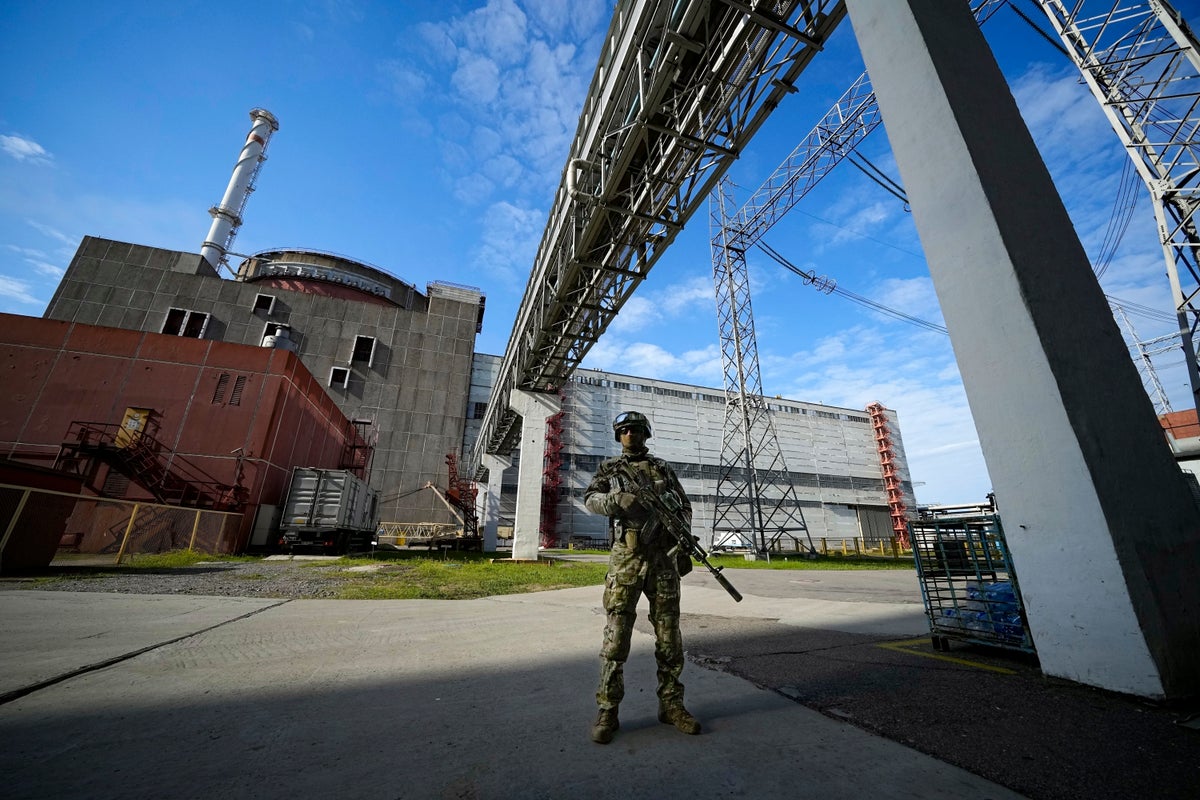
Russia is reducing its presence at the Zaporizhzhia nuclear power plant, Ukraine’s military intelligence agency has claimed, with Kyiv accusing Moscow of plotting a “terrorist attack” at the facility.
The number of military patrols around the site of the largest nuclear power plant in Europe and in the nearby city of Enerhodar have gradually been decreasing, according to the Main Directorate of Intelligence at the Ministry of Defence (GUR). Meanwhile, personnel remaining at the plant – which is occupied by Moscow’s forces – have been told to blame Ukraine “in case of any emergency situations”, says Kyiv.
“According to the latest data, the occupation contingent is gradually leaving the territory of the Zaporizhzhia nuclear power plant,” GUR said on the Telegram messaging app.
The GUR said that among the first to leave the nuclear power station were three employees of Russian state nuclear firm Rosatom who had been “in charge of the Russians’ activities”. It said Ukrainian employees who have signed a contract with Rosatom had also been advised to depart.
Employees should leave by 5 July, it said, and preferably head for the Crimea peninsula, which Russia illegally annexed from Ukraine in 2014.
Earlier this month, Ukraine’s president Volodymyr Zelensky said that Kyiv had received intelligence about an attack on the facility that would result in a radiation leak. He added that they had shared the information with partners including the United States, China, Europe, Brazil and India.
A Ukrainian emergency worker wearing radiation protection suit attends training in Zaporizhzhia— (AP)
“Intelligence has received information that Russia is considering the scenario of a terrorist act at the Zaporizhzhia nuclear plant – a terrorist act with radiation leakage,” he said. “Radiation has no state borders. Whomever it will hit is deterred only by the direction of the wind... The world has been warned, so the world can and must act,” he added. The head of the GUR, Kyrylo Budanov, has also previously alleged that Moscow has mined a number of the power units at the plant, as well as a cooling pond.
Ukraine conducted nuclear disaster response drills in the vicinity of the plant on Thursday. The Kremlin has denied all of Kyiv’s allegations over the plant and yesterday, the foreign minister, Sergei Lavrov, accused Ukraine of playing a dangerous game over the Zaporizhzhia plant claiming they were telling “pure lies” and that statements suggesting Moscow plans to blow up the plant were untrue.
Beyond Zaporizhzhia, Mr Zelensky has ordered military commanders to strengthen Ukraine’s northern military sector following the news that the Russian Wagner mercenary leader Yevgeny Prigozhin had arrived in Belarus following a failed mutiny against Moscow. Wagner forces have been invited to join Mr Progozhin and there has been speculation they could set up a new base at a vacant military facility near the town of Asipovichi, about 90km (50 miles) from the Belarusian capital, Minsk.
After pushing Russian forces out of northern regions last year, Ukraine took steps to tighten the defence of its border with Belarus, a close ally of Russia.
“Right now, there is no direct threat of offensive actions from Belarus and Russia in the zone that is the responsibility of the Northern Group of Forces,” ‘North’ commander General Serhiy Naev said. But he said moves to strengthen Ukraine’s defence capabilities were needed in the event of a growing threat, and added: “Our intelligence does not stop work to obtain information.”
Elsewhere, a senior Ukrainian defence official said that Kyiv’s troops are advancing in all directions of their counteroffensive against Russian forces. Since the start of the counteroffensive this month, Ukraine says it has reasserted control over clusters of villages in the southeast although Russia still holds swathes of territory in the east, south and southeast.
“If we talk about the entire frontline, both east and south, we have seized the strategic initiative and are advancing in all directions,” the deputy defence minister, Hanna Maliar, told Ukrainian television.
Ms Maliar said Ukrainian troops were moving “confidently” on the flanks around the devastated eastern city of Bakhmut, which is held by Russian forces, and the main fighting was going on around the city.
In the south, Kyiv’s forces were moving with mixed success and mainly levelling the frontline, she said.
“In the south, we are moving with varying success, sometimes there are days when it is more than a kilometre, sometimes less than a kilometre, sometimes up to 2km,” she said.
She noted that the effectiveness of the counteroffensive should be evaluated by “a lot of different military tasks” and not just by advances and the liberation of settlements.
In Washington, General Mark Milley of the US Army said the Ukrainian counteroffensive against Russian forces is “going slower than people had predicted”, but is making steady progress. “It is advancing steadily, deliberately, working it’s way through very difficult minefields, et cetera,” he said.
Reuters and Associated Press contributed to this report







